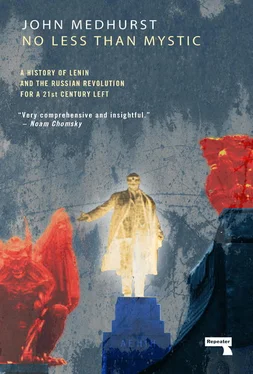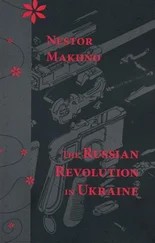In the same year, Luxemburg wrote a pamphlet called Leninism or Marxism? , in which she identified the danger of giving the leadership of a revolutionary socialist party sweeping powers that “would multiply artificially and in a most dangerous measure the conservatism which is the necessary outgrowth of every such leadership”. She concluded:
There is nothing which so easily and so surely hands over a still youthful labour movement to the private ambitions of intellectuals, as forcing the movement into the straight-jacket of a bureaucratic centralism which debases the fighting workers into the pliable tools of the hands of a ‘committee’. 29
It was not only Luxemburg who foresaw the future. On arrival in London in 1902 after escaping Siberian exile, Leon Trotsky initially gravitated to Lenin. But Lenin’s intolerance and hyper-centralism revolted him. When the split came Trotsky sided with the Mensheviks, although his allegiance would be highly quixotic (several times he tried to meld the two sides of Russian Marxism back together but the divisions went too deep). After the Congress he wrote a pamphlet, Our Political Tasks , in which he analysed Lenin’s plans for a centralised party in which only full-time professionals had initiative and command. He criticised Lenin for setting up an “orthodox theocracy” in the party and came out for a conception of the party similar to that of Martov and Luxemburg. Lastly, he predicted what would occur if Lenin’s schemes were fully implemented. “Lenin’s methods”, he wrote,
lead to this: the party organisation at first substitutes itself for the party as a whole; then the Central Committee substitutes itself for the organisation; and finally a single dictator substitutes himself for the Central Committee.
Trotsky would live to see every part of his prediction come true.
CHAPTER THREE
1905–The First People’s Revolution
RSDLP workers who risked prison and exile to distribute Iskra were baffled by reports of a massive schism at the London Congress. The young worker Pianitsky echoed many activists on the ground when he recalled, “I could not understand why petty differences kept us from working together”. Even Lenin’s acolyte, the Bolshevik engineer Krzhizhanovky, admitted that when he heard the criticism leveled at Martov by supporters of Lenin, “the thought of Comrade Martov’s opportunism seemed particularly farfetched”. 1After the Congress, having been defeated on the criteria for membership, Lenin also lost control of the editorial board . Plekhanov, appalled at the split and at the manner in which he had forfeited the support of his old comrades for a man he could not abide, reversed himself rapidly and took against Lenin. Without his support Lenin no longer controlled Iskra .
Despite claims from his latter-day defenders that Lenin was reluctant to pursue the split, his actions speak otherwise. In his account of the Congress, One Step Forward, Two Steps Back (1904), Lenin claimed that differences on organisational points reflected a deeper and more significant divide. Referring to Martov’s off-hand remark that Lenin’s centralised schema would turn members in to “serfs”, he wrote that this revealed a strain of bourgeois individualism unworthy of a proletarian revolutionary. “To the individualism of the intellectual”, he wrote, “which already manifested itself in the controversy over Paragraph 1, revealing its tendency to opportunist argument and anarchistic phrase mongering, all proletarian organisation and discipline seems to be serfdom”. 2Instead of working within the newly formed RSDLP and contributing to its official newspaper, Iskra , he opted to create a separate newspaper, Vyperod (Forward), and began to organise his own parallel organisation of activists to distribute it. Almost alone he set out to organise a new Congress which hardly anyone else in the party wanted.
Although the majority of the party’s new Central Committee were Bolsheviks, even they did not wish for the split to continue. Five of the six members of the Central Committee then in Russia wrote publicly that they did not approve of Lenin’s actions. They made clear that they wished to reconcile with the Mensheviks who ran Iskra and reforge party unity. As even Tony Cliff admits, “resistance to the split was wide-spread amongst the rank and file”. 3Yet Lenin was determined that the most constructive thing he could do to further the cause of socialism in Russia was pursue it to its bitter end. “It took months of Herculean effort”, Cliff noted admiringly, “actually to put in to effect the break between Bolsheviks and Mensheviks in a number of Russian cities”. 4The final break in Moscow did not take place until May 1905, just in time to prevent united social-democratic action in the 1905 Revolution.
Almost unnoticed by the émigré Marxists, Russia was moving ever closer to revolution. A period of relative economic prosperity, based on the state-led economic expansion of the 1890s, had come to an end, and unemployment had rocketed. In similar fashion to the UK in 2010-11, the first mass protests against unbearable conditions arose not from the trade unions but from a radicalised student movement. Between 1860 and 1914 the number of university students in Russia grew from 5,000 to 69,000, and the number of newspapers shot up from a paltry thirteen (almost all in St Petersburg and Moscow) to 856. This produced an increasingly politicised intelligentsia.
The trade unions, emboldened by mass student demonstrations, followed suit. On 1st May, 1900 there was a general strike in Kharkov in which, for the first time, explicitly political demands were made. From 1901 workers in other cities such as Moscow, Kiev and Tomsk began to participate in student demonstrations. When a “general strike” of 30,000 students took place during winter 1901-02, workers in Moscow joined in and helped to fight off armed Cossacks sent to disperse it. In 1903 a wave of political strikes spread throughout the Ukraine and Georgia–Baku, Tiflis and Odessa saw mass demonstrations and street fighting.
Even middle-class liberals began to organise. In 1903 the Union of Liberation was founded by senior members of the intelligentsia, led by the liberal academic Paul Miliukov. It relied heavily on Peter Struve, who formulated a political programme for constitutional reform in Russia. Under the influence of his journal Liberation , published in Germany, the Union adopted reformist policies, including the introduction of universal suffrage, self-determination for the nationalities of the Empire, and a variety of progressive social reforms such as unemployment and health insurance. Many radical students gravitated to the Union. Many also joined the SRs and the RSDLP. Although democratic reforms were clearly necessary, the Tsar and reactionaries such as Interior Minister von Plehve clung to the principles of autocracy.
In 1904 Russia declared war on Japan over a disputed territory, Port Arthur, in Manchuria, mainly because von Plehve wanted “a small, victorious war to stem the tide of revolution”. When Japan attacked Port Arthur, Russia’s military commanders assumed a quick victory over a nation they held in racist contempt. But the Baltic Fleet, having sailed halfway around the world to meet the enemy, was promptly sunk at the battle of Tsushima, losing eight battleships and 5,000 men to Japanese losses of three torpedo boats. A month later, when the SRs assassinated von Plehve, most of the country openly celebrated and the “Zemstvo Men” revived their call for a National Zemstvo Assembly.
Von Plehve’s successor, Prince Mirsky, a liberal reformer, wrote to Nicholas, “It is imperative to make peace, or else Russia will soon be divided into those who carry out surveillance and those who are under surveillance, and then what?” Upon taking up his post, Mirsky relaxed censorship, abolished corporal punishment and brought back Zemstvo men whom von Plehve had banished. Blocked at Court, he decided to convene a Zemstvo Assembly on his own authority and thus present the Tsar with a fait accompli .
Читать дальше












